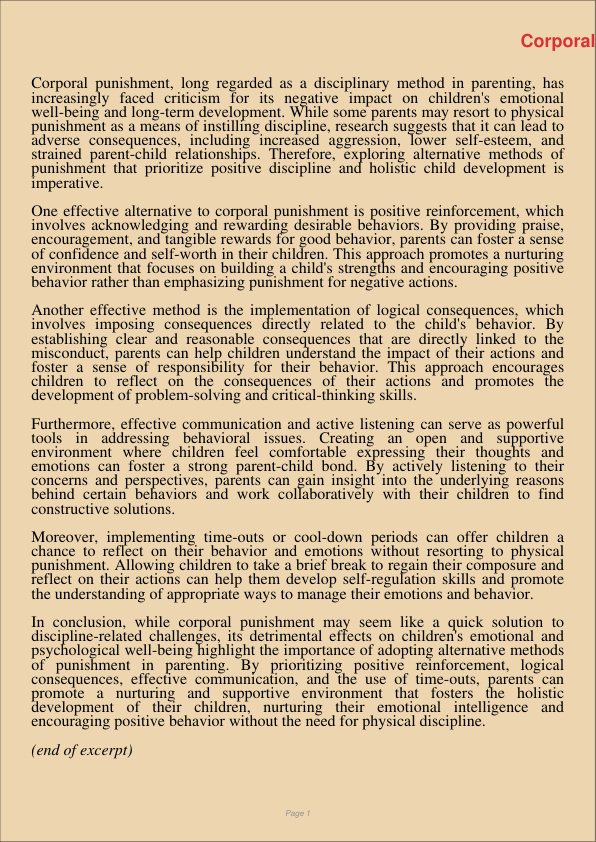Corporal Punishment DoesnT Work In Parenting Alternative Methods Of Punishment
Dec 31, 2023
alternative methods
corporal punishment
History
Environmental Studies
Corporal punishment, long regarded as a disciplinary method in parenting, has increasingly faced criticism for its negative impact on children’s emotional well-being and long-term development. While some parents may resort to physical punishment as a means of instilling discipline, research suggests that it can lead to adverse consequences, including increased aggression, lower self-esteem, and strained parent-child relationships. Therefore, exploring alternative methods of punishment that prioritize positive discipline and holistic child development is imperative.
One effective alternative to corporal punishment is positive reinforcement, which involves acknowledging and rewarding desirable behaviors. By providing praise, encouragement, and tangible rewards for good behavior, parents can foster a sense of confidence and self-worth in their children. This approach promotes a nurturing environment that focuses on building a child’s strengths and encouraging positive behavior rather than emphasizing punishment for negative actions.
Another effective method is the implementation of logical consequences, which involves imposing consequences directly related to the child’s behavior. By establishing clear and reasonable consequences that are directly linked to the misconduct, parents can help children understand the impact of their actions and foster a sense of responsibility for their behavior. This approach encourages children to reflect on the consequences of their actions and promotes the development of problem-solving and critical-thinking skills.
Furthermore, effective communication and active listening can serve as powerful tools in addressing behavioral issues. Creating an open and supportive environment where children feel comfortable expressing their thoughts and emotions can foster a strong parent-child bond. By actively listening to their concerns and perspectives, parents can gain insight into the underlying reasons behind certain behaviors and work collaboratively with their children to find constructive solutions.
Moreover, implementing time-outs or cool-down periods can offer children a chance to reflect on their behavior and emotions without resorting to physical punishment. Allowing children to take a brief break to regain their composure and reflect on their actions can help them develop self-regulation skills and promote the understanding of appropriate ways to manage their emotions and behavior.
In conclusion, while corporal punishment may seem like a quick solution to discipline-related challenges, its detrimental effects on children’s emotional and psychological well-being highlight the importance of adopting alternative methods of punishment in parenting. By prioritizing positive reinforcement, logical consequences, effective communication, and the use of time-outs, parents can promote a nurturing and supportive environment that fosters the holistic development of their children, nurturing their emotional intelligence and encouraging positive behavior without the need for physical discipline.
